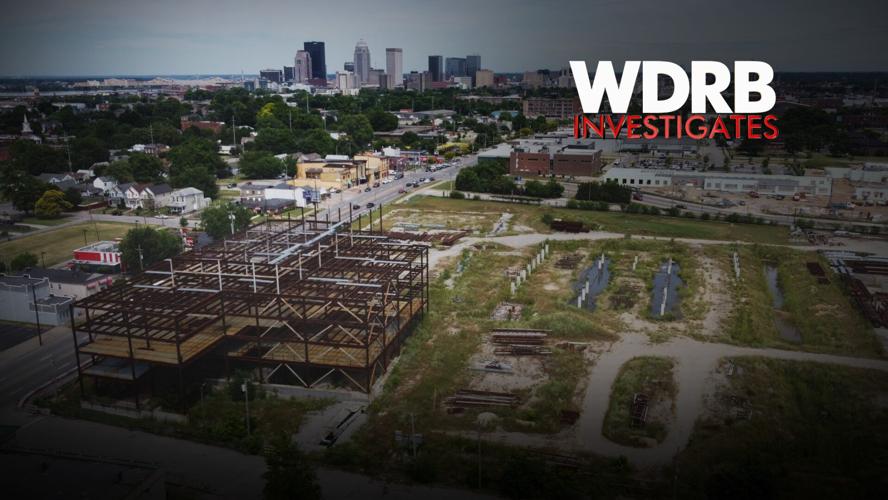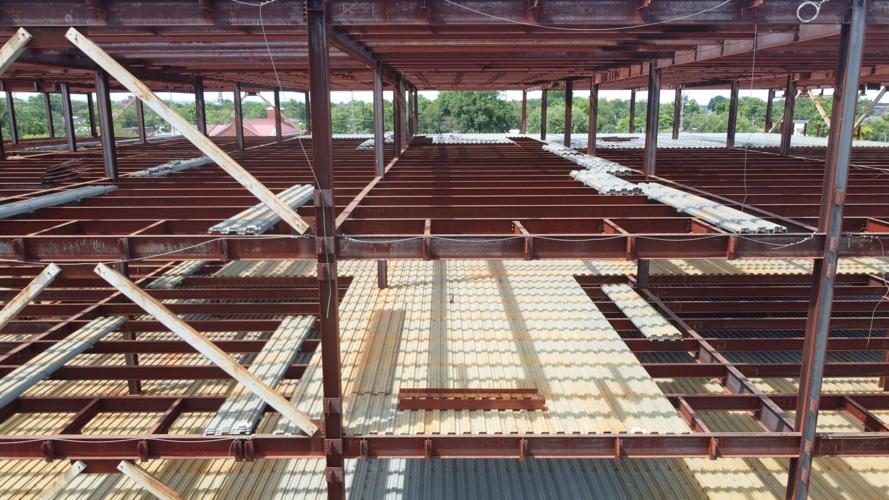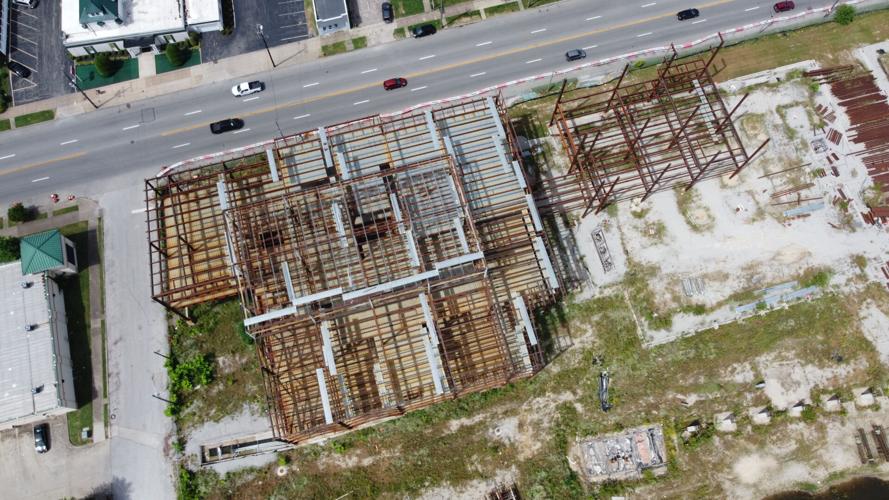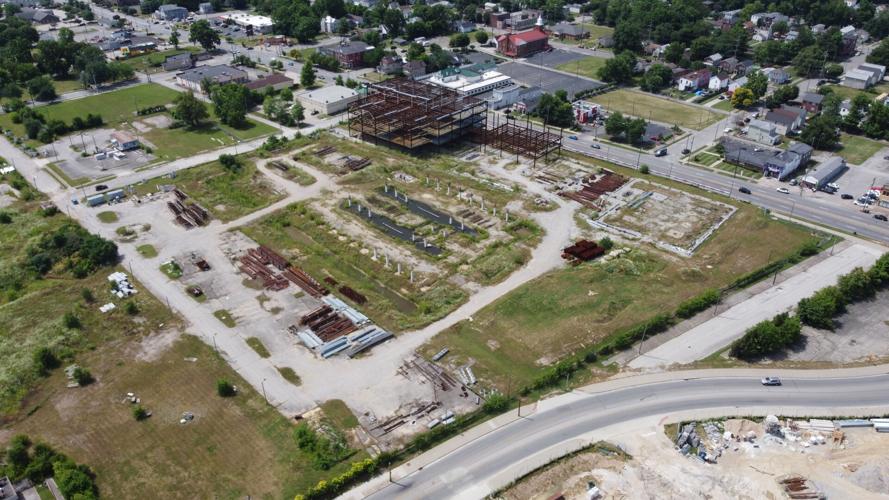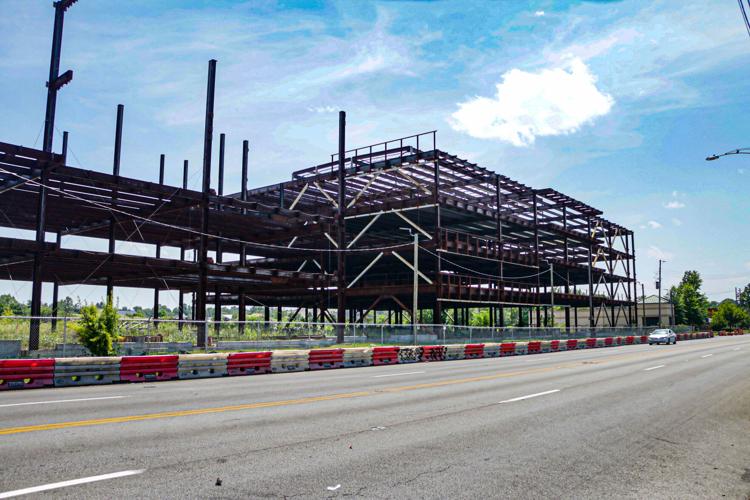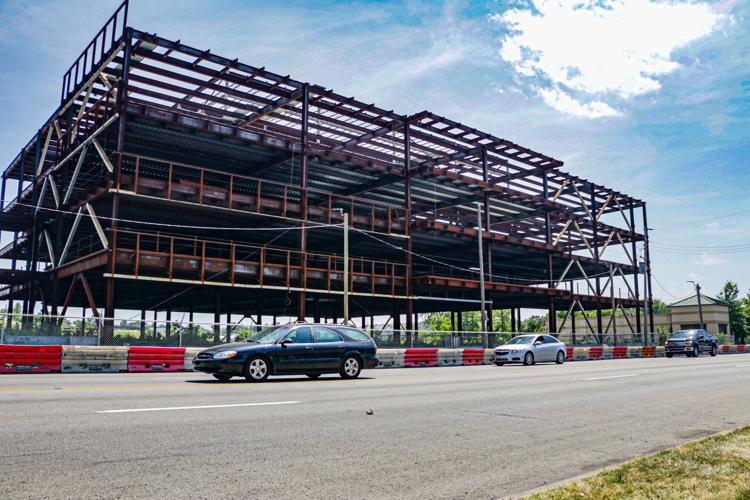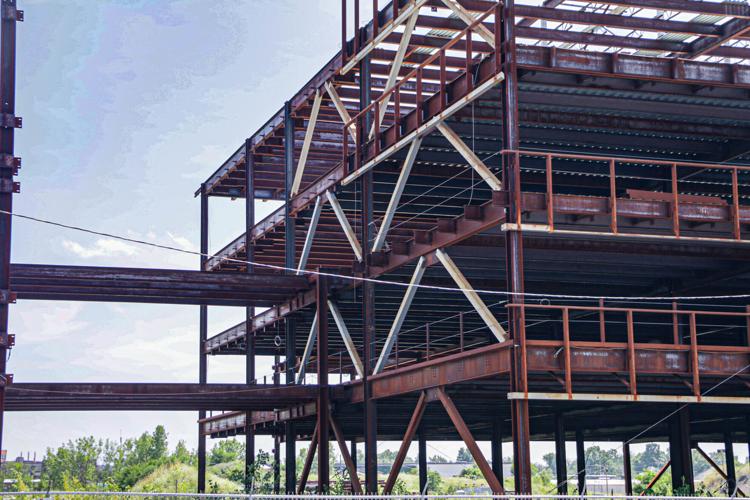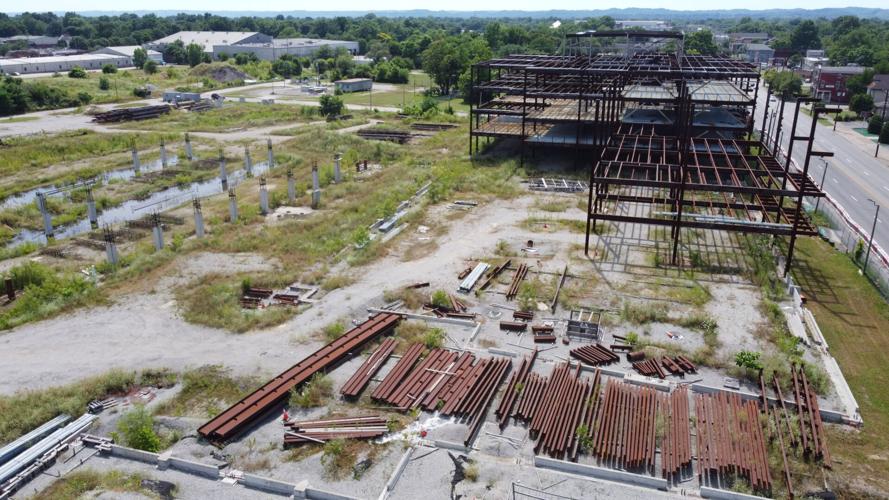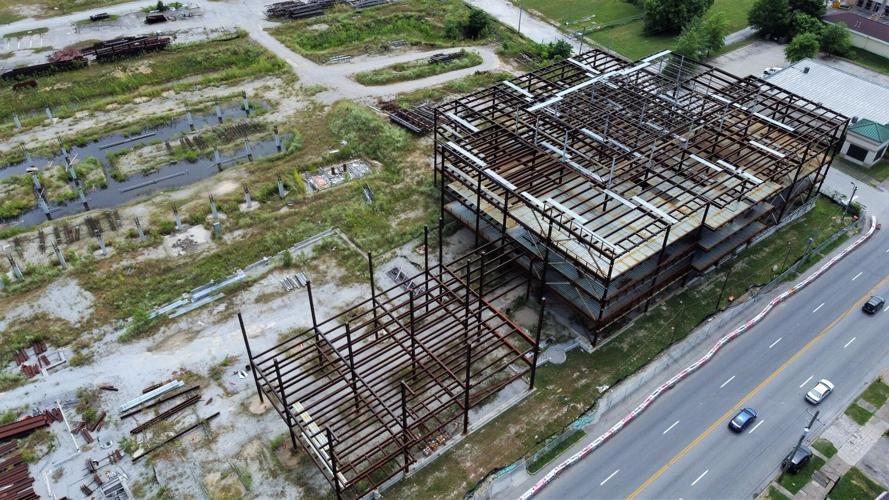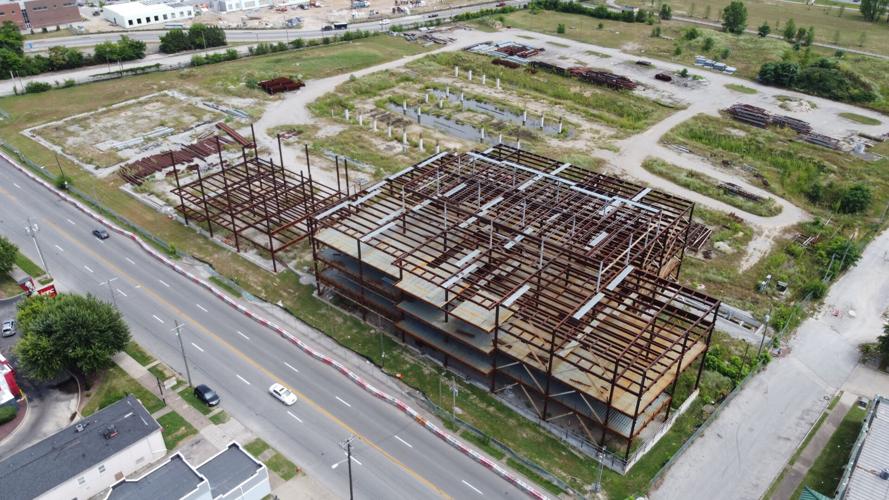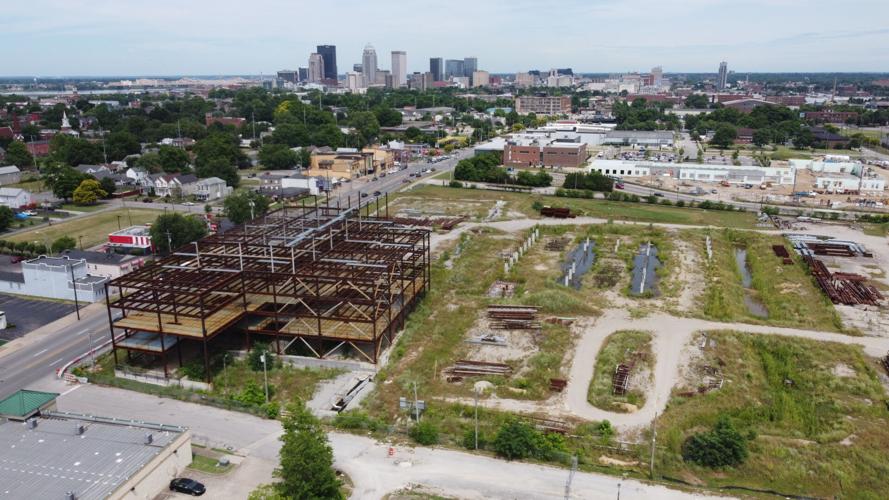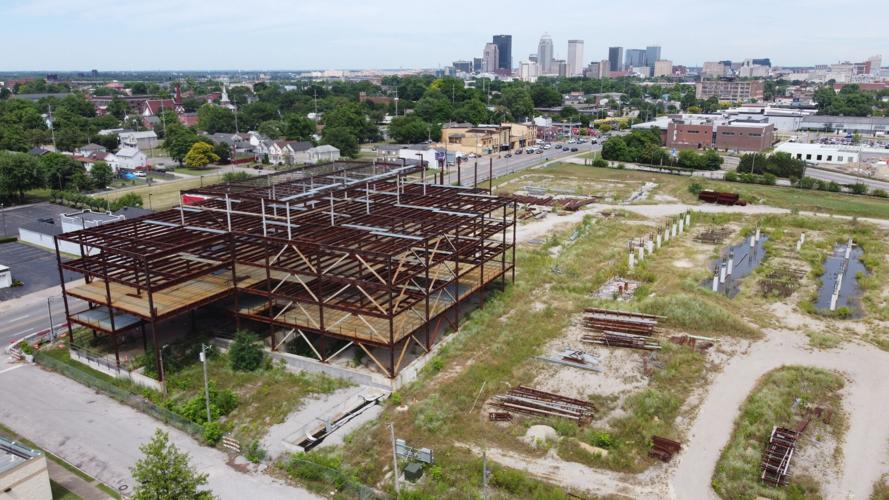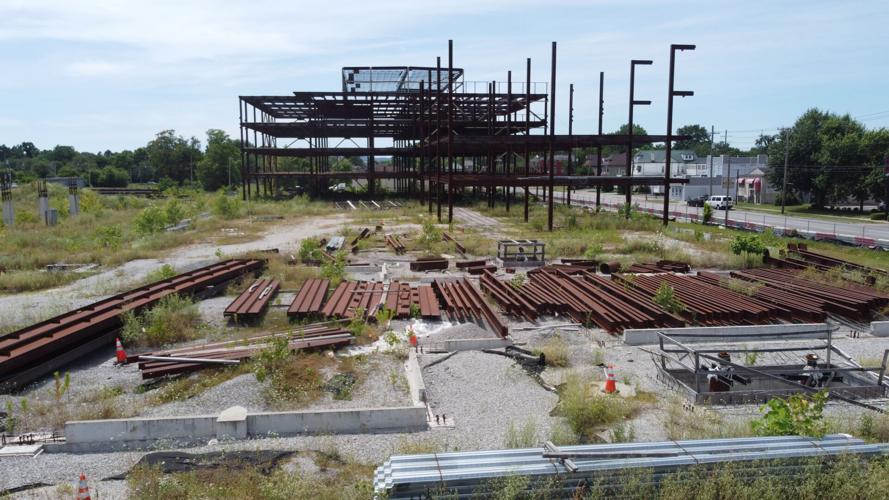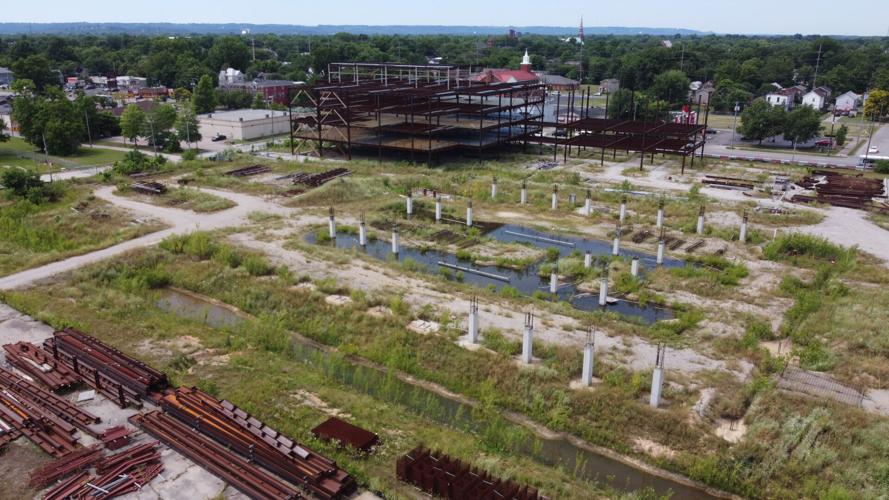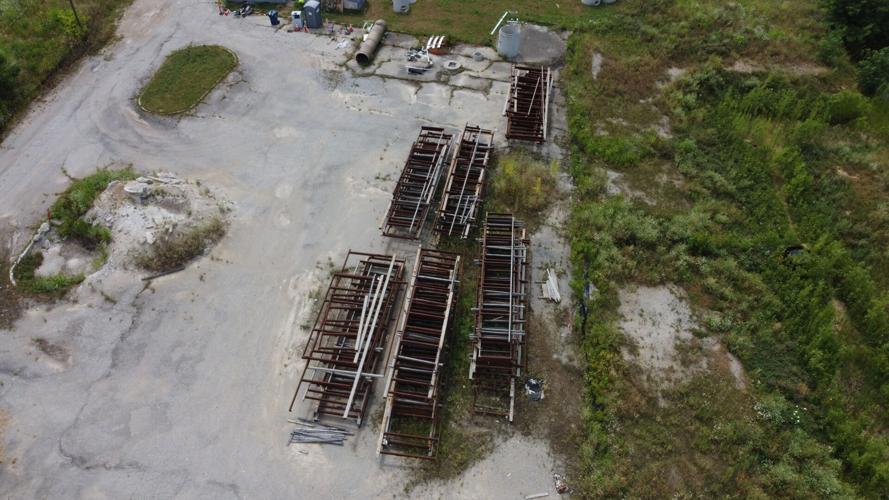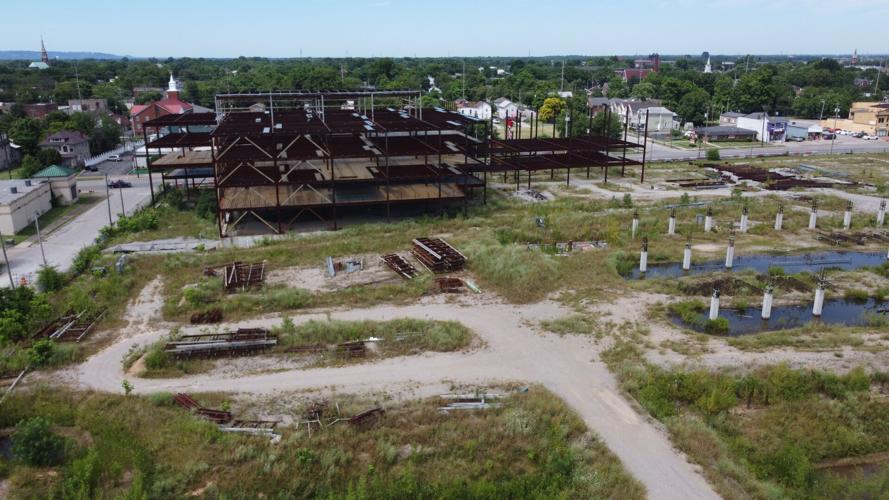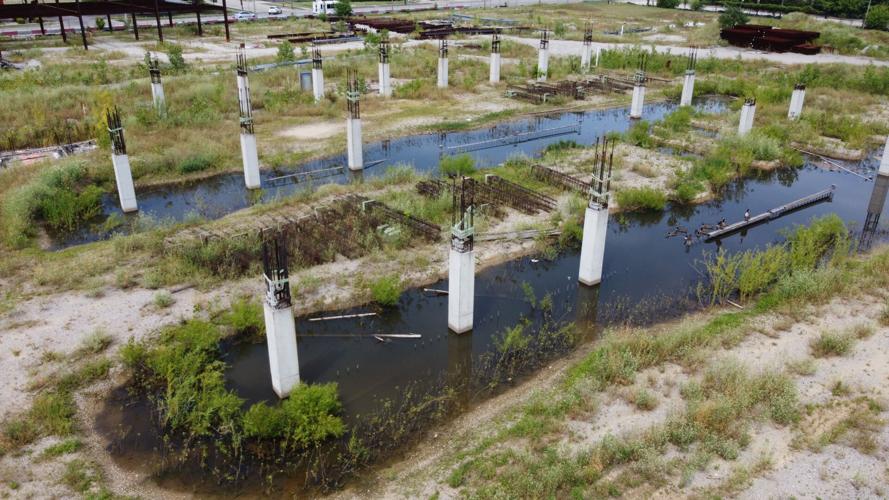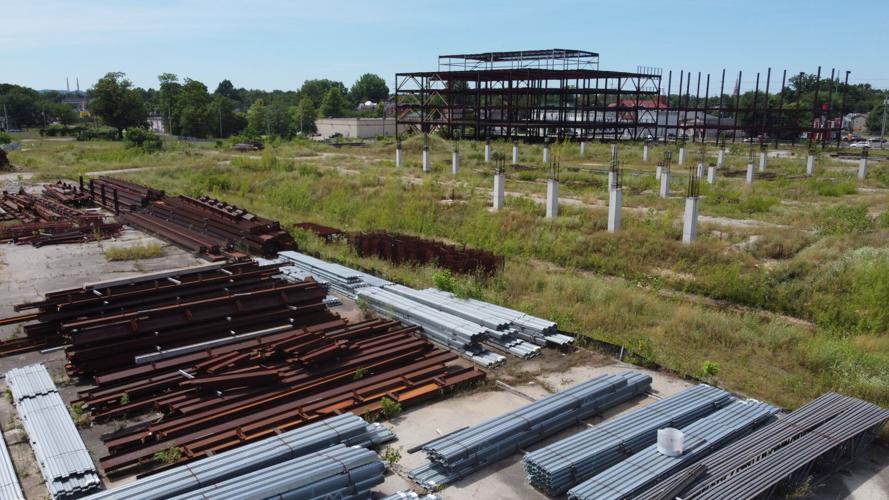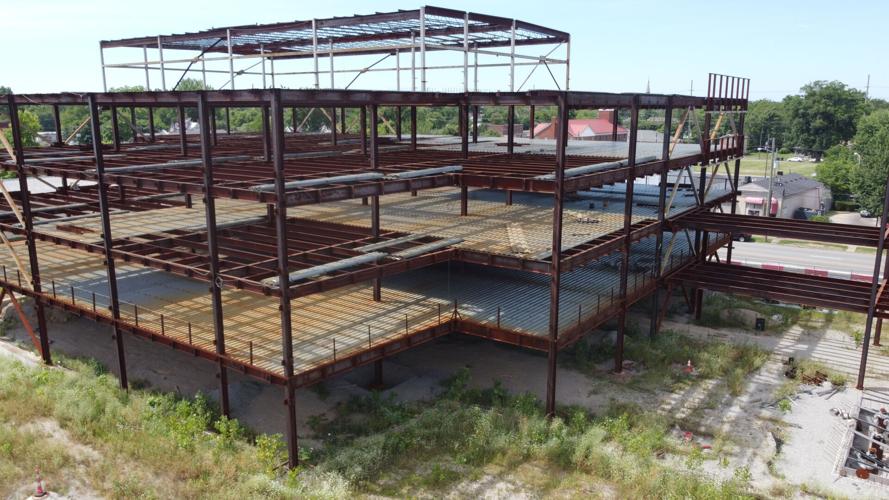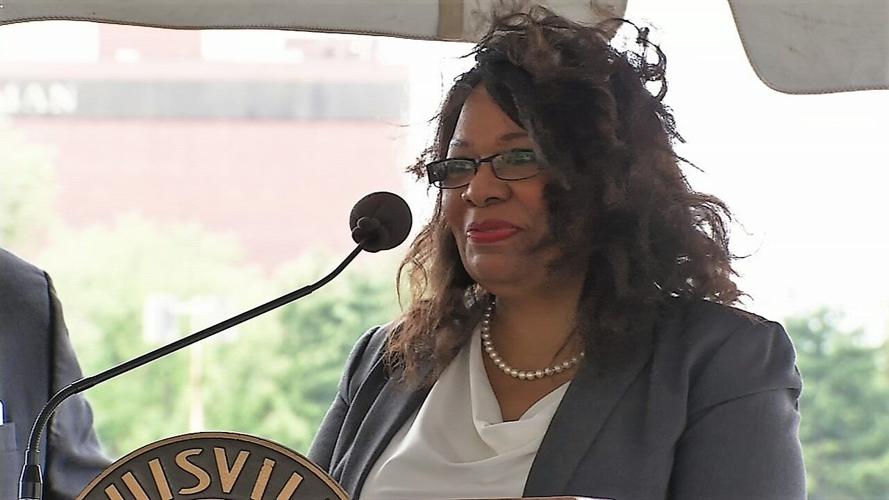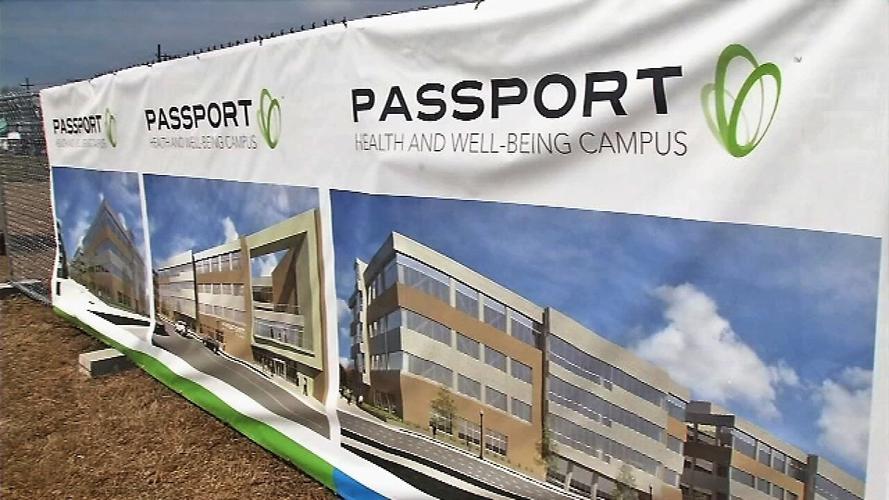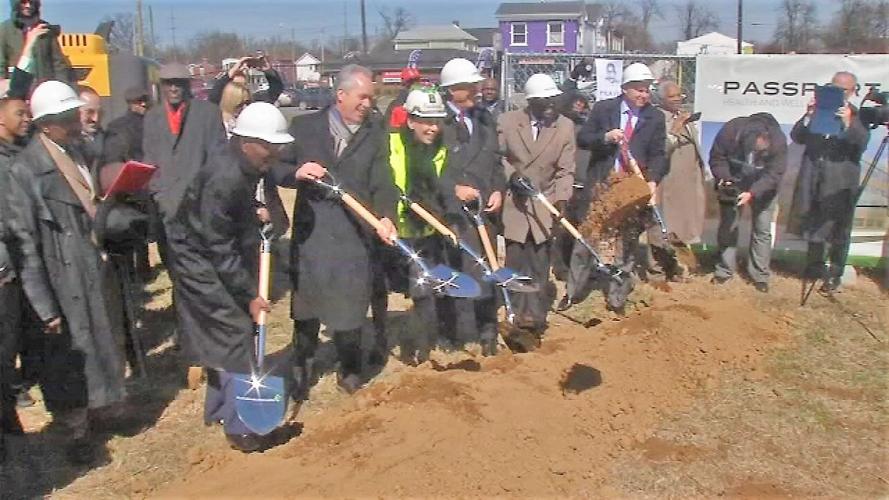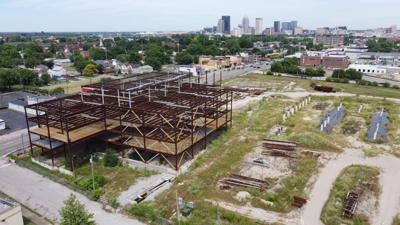LOUISVILLE, Ky. (WDRB) — When she saw the steel beams rising into place in late 2018, Jackie Floyd no longer doubted that something was finally happening at the long-vacant site near her west Louisville home.
Passport Health Plan, a locally grown, nonprofit health insurer, had started work on a four-story office building for hundreds of its employees. It was the first part of a “health and wellbeing” campus on about 20 acres at 18th Street and Broadway.
Passport came to the rescue after Walmart finally walked away in 2017 from a deal announced three years prior to build a SuperCenter on the site.

Jackie Floyd, a resident and organizer in west Louisville's Russell neighborhood, pictured outside the former Passport headquarters site at 18th Street and Broadway on June 16, 2022.
Floyd was hopeful. Passport would bring employment opportunities to a historically impoverished part of Louisville, while dedicating the rest of the site to community needs, such as new housing, doctor’s offices — perhaps even a community grocer, pharmacy or walking track.
Nearly two decades after Philip Morris closed its cigarette plant and donated the West Broadway site to Louisville, the land would finally become something positive.
“I thought, ‘OK, we are on the move,’” Floyd, a longtime resident and organizer in the adjacent Russell neighborhood, told WDRB News. “… I thought it was a great idea, and I was all for it.”
But Passport abruptly stopped work in early 2019, as the organization’s finances deteriorated and it hurdled toward a fire sale.
Three years later, the rusting steel skeleton of the office building towers over Broadway. Rebar protrudes from concrete columns. Weeds have grown up through construction materials left behind. Last week, a flock of geese waded through rainwater that had ponded in the middle of site.
Meanwhile, it’s been years since anyone — whether people involved with Passport or its successor organizations, or city officials — explained to residents why the prominent site is languishing.
“It’s just heart-wrenching,” said Yolanda Walker, a 30-year resident of Louisville’s California neighborhood and president of the California Neighborhood Leadership Council. “Every time you go past that, you just look at it, and it’s just like, ‘What is happening. What is going on?’”
Floyd said the condition of the site and the lack of communication about it has been “very disrespectful to the residents of the West End, and we deserve better than this.”

Passport Health Plan once planned a health and wellbeing campus at 18th and Broadway but stopped construction in 2019. WDRB file photo
The future of the site lies with Molina Healthcare, a Fortune 500 health insurance company based in Long Beach, California, which entered Kentucky’s Medicaid market in 2020. Molina took over Passport’s brand, and the roughly 300,000 low-income Kentuckians who got Medicaid coverage through Passport are now covered by Molina.
Molina, for its part, said it’s still committed to bringing a “community-focused” development to west Louisville. But two years after it became the successor to Passport, the company has yet to take ownership of the site.
It was only last month that Evolent Health, a Virginia company that used to be deeply intertwined with Passport, bought the site for about $12 million, the first step toward its eventual sale to Molina.
The last two years, as the weeds and trash have grown to the point of Louisville issuing a property maintenance citation, the site remained within the remnants of the old Passport organization.
Part of what held things in limbo — though no one involved will talk about it — was an apparent payoff of $2.27 million earlier this year to the local developers to whom former Louisville Mayor Jerry Abramson effectively gifted the west Louisville property 15 years ago, according to real estate and court records.
The payoff to Newbridge Development, owned by Teresa and Frank Bridgewaters, came from a nonprofit organization involving Evolent and the University of Louisville. U of L wouldn’t say whether there was any university money involved.
The silence and inaction underscores how, over 20 years and two mayoral administrations, Louisville Metro officials allowed what was once a public asset — Philip Morris deeded it to city government for $100 in 2002 — to be fully privatized without any development materializing.
Whatever is ultimately built there, if anything, is now up to Molina, a corporation headquartered 2,000 miles away.
In a statement for this story, Mayor Greg Fischer’s spokeswoman didn’t directly address the reasons for the recent stasis or how the city, over decades, lost control of the once-donated site.
“After years of efforts to redevelop the site, we are anxious to work with Molina Healthcare to return the long-vacant site to a productive use,” Fischer spokeswoman Jessica Wethington said.
She added that the eventual Molina development will join other positive developments in west Louisville, such as the new YMCA at 17th and Broadway; the Louisville Urban League’s track-and-field complex; the planned Norton hospital and Goodwill Industries headquarters at 28th and Broadway; and the redevelopment of the Beecher Terrace public housing complex.
Walker, the California neighborhood resident, said she doubts such a prominent site would be allowed to languish so long in more prosperous areas of Louisville. In her neighborhood, 90% of residents are Black, while the median income is a third of Jefferson County’s as a whole and the rate of food-stamp recipients is four times higher.
"Nothing would sit like that anywhere else, is how the community feels," she said.
'A really amazing opportunity'
Molina’s promises to revive the west Louisville development date to late 2019, when the big health insurer was trying to break into the Kentucky Medicaid business. The company’s CEO, Joseph Zubretsky, personally pitched the idea to Gov. Andy Beshear and to a selected group of community members gathered at the Louisville Urban League, The Courier-Journal reported at the time.
Floyd, the Russell organizer, was among the attendees at the community meeting. She recalls talk of possible call center jobs for area residents.
On May 29, 2020, Beshear’s administration revealed that Molina was one of five health insurance companies that would be given long-term Medicaid contracts. Passport, which was formed in the late 1990s by local healthcare providers such as U of L and Norton Healthcare, was denied a contract, effectively killing the organization.
What then, would become of the west Louisville construction project that had already been stalled for more than a year?
At the time, Beshear said he was encouraged by Molina’s commitment to completing the project, including locating up to 1,100 employees at the site.
"1,100 new jobs created … in an area that hasn’t seen enough new jobs, with what we hope is a company that will be incredibly stable, could be a really amazing opportunity," Beshear said the day the awards were announced.
Beshear’s office did not respond to questions for this story.
A few months after winning the Medicaid business, Molina further eased its entry into Kentucky by purchasing Passport, which U of L and the other local founders had sold in 2019 to Evolent Health, a close business partner of Passport’s since 2016.
Molina is now firmly ensconced in the Kentucky Medicaid market with its "Passport Health Plan by Molina Healthcare" brand. Beshear’s administration also allowed Molina to inherit Passport’s more-than 300,000 members over the objection of other companies providing coverage, such as Louisville-based Humana, according to court records.
Molina also absorbed the former Passport and Evolent employees and now employs about 700 in Kentucky.
The west Louisville real estate was also part of the 2020 Molina-Evolent deal, but the companies have yet to pass the site between them. The first step — for Evolent to purchase the site free and clear of liens — was only completed last month, according to county records.
Despite the delay, Molina said it has "long been committed" to taking control of the property.
In a written statement, the company said it plans to bring in a third-party developer to create a "'community focused' property on the site," though the statement didn’t spell out what exactly will be built there or when Molina will get started.
"While the timing of any development can be uncertain due to uncontrollable factors, Molina is committed to moving the project forward," the statement said.
Molina also confirmed that it plans to grow to 1,100 Kentucky employees and still envisions an office on the site.
"While the pandemic has changed where people work, Molina intends to locate all local employees who are required to work in an office at the west Louisville location," a Molina spokesperson said. "Molina will also create as part of the property other like-kind office space and space for health care related purposes."

Passport Health Plan abruptly stopped work on its headquarters office building and "health and wellbeing" campus at 18th Street and Broadway in 2019. Three years later, the site remains an eyesore, and neighbors wonder who is in charge. Zach Crabtree, WDRB News, June 16, 2022
Real estate tied up
Despite Passport’s sale to Evolent in 2019 and Evolent’s subsequent sale of Passport to Molina in 2020, the west Louisville site never changed hands after it was mothballed in February 2019.
It remained with University Health Care Inc., the nonprofit organization that historically operated the Passport plan, but had little purpose following the 2019 sale of Passport to Evolent. The west Louisville site was a final loose end for University Health Care to tie.
Starting in 2020, University Health Care was controlled jointly by U of L and by Evolent, who together appointed six of its seven board members.
No one from University Health Care agreed to be interviewed about why the west Louisville site has languished since 2019.
Evolent, whose former CEO Frank Williams chaired University Health Care in 2020 and 2021, declined to comment. University Health Care’s current chairman, Bill Wagner, the retired CEO of Louisville’s Family Health Centers, referred questions to U of L Health.
In an emailed statement, U of L Health spokesman David McArthur said the real estate’s transfer to Evolent was held up “due to a number of factors including the third rebidding of the Kentucky Medicaid contract and COVID-19.”
McArthur was referring to a two-year-old court battle among health insurance companies over which ones should have a piece of Kentucky’s Medicaid business. (There were only two rounds of bidding for Kentucky’s most recent Medicaid contracts, though a judge has ordered a third round.)
Still, McArthur declined to say specifically how that dispute and the pandemic delayed the disposition of the west Louisville site.
A $2.27 million payoff

Teresa Bridgewaters of Newbridge Development and TMG at the 2017 announcement that Passport Health Plan would develop the West Broadway site. WDRB file video
Public records reveal another factor that likely kept the site in limbo: a $2 million dispute involving the original developers of the west Louisville site, Frank and Teresa Bridgewaters.
The Bridgewaterses did not return a call and email for this story, and an attorney who represented them in the dispute also declined to comment. University Health Care, through an attorney, also declined to comment, and U of L Health’s McArthur didn’t answer questions about the dispute.
The owners of a commercial construction services company called The Mardrian Group or TMG, the Bridgewaterses first got involved in 2006, when then-Mayor Abramson gave their company, Newbridge Development, the west Louisville site. In return, they promised to spend an estimated $1.3 million to demolish the old cigarette plant buildings and to develop the site according to specifications agreed to by the city.
In 2010, the city allowed Newbridge to sell a piece of the site to neighboring Brown-Forman Corp. for $1.2 million. After the Walmart deal was inked in 2013, Fischer’s administration cut a $1.1 million check to Newbridge to buy additional land needed for the big-box retailer. But as WDRB News reported in 2017, Newbridge spent only $357,000 on additional property, and it wasn’t clear what happened to the rest of the money.
By the time Passport came along in 2017, Newbridge was facing the possibility of losing the site to a bank that was foreclosing to collect a $1.7 million debt Newbridge had taken out. But the $7.1 million that Newbridge received from Passport for the land allowed the retirement of the debt.

Louisville Mayor Greg Fischer, center, and others broke ground on the Passport campus in west Louisville in March 2018. WDRB file photo
Louisville Metro also decided not to attempt to collect the remainder of the $1.1 million it had given Newbridge in 2013, a decision that Fischer’s then-development chief said was made from expediency to allow for the Passport deal.
But even after Passport bought the property and began construction, the Bridgewaterses were not completely out of the picture.
In July 2021, Newbridge sued University Health Care for $2 million, plus interest and costs, which the company claimed it was still owed from the 2017 deal to sell the land to Passport. Newbridge had been trying to collect the money from Passport since 2019, according to documents filed with the lawsuit.
Court records show Passport had agreed in 2017 to carve out a corner piece of the site after the sale, which it would give back to Newbridge to market to users such as a CVS or Walgreens. If they secured a drug store, Passport guaranteed that the Bridgewaterses’ company would realize at least $2 million.
Mark Carter, who was the CEO of Passport until its sale to Evolent, told WDRB News this week that the $2 million guarantee represented a compromise with the Bridgewaterses, who wanted a higher price for the west Louisville site.
"We were basically negotiating a total price. And we (Passport) hit a limit on how much cash we wanted to put into it, which was about $7 million," said Carter, who is now commissioner of the Kentucky Department of Aviation in the Beshear administration. "And they wanted $9 million for the land. And so, we worked out an arrangement."
It isn’t clear why Newbridge was never given the parcel meant to become a drug store. But Carter said the Walgreens or CVS was envisioned as one piece of a much bigger development, so it likely would have been hard to market the land after Passport abruptly stopped construction of the main office building.
In January 2022, University Health Care paid Newbridge $2.27 million to give up any remaining claim to the west Louisville site, including from the dispute raised in Newbridge’s lawsuit, according to a Jefferson County deed. The same month, Newbridge permanently withdrew the lawsuit without specifying how it was resolved.
McArthur didn’t respond when asked if U of L Health funded any of the payment.
With Newbridge no longer holding a possible claim, University Health Care and a subsidiary company were finally able to sell the property to a subsidiary of Evolent Health in May.
The $12 million in proceeds went to the original "sponsors" of Passport, according to McArthur. Those are U of L, Norton Healthcare, the successor to Jewish Hospital & St. Mary’s Healthcare and the Louisville/Jefferson County Primary Care Association.
Now comes the final step: For Molina to purchase the property from Evolent. Neither company will say when that will happen.
Walker, the California neighborhood leader, said it’s "sad" there has been little so progress when the site could have been used for any number of west Louisville needs: shopping, medical care, senior housing, recreation, fresh food, among others.
"It is depressing," she said. "Seeing it, it just makes you angry."
